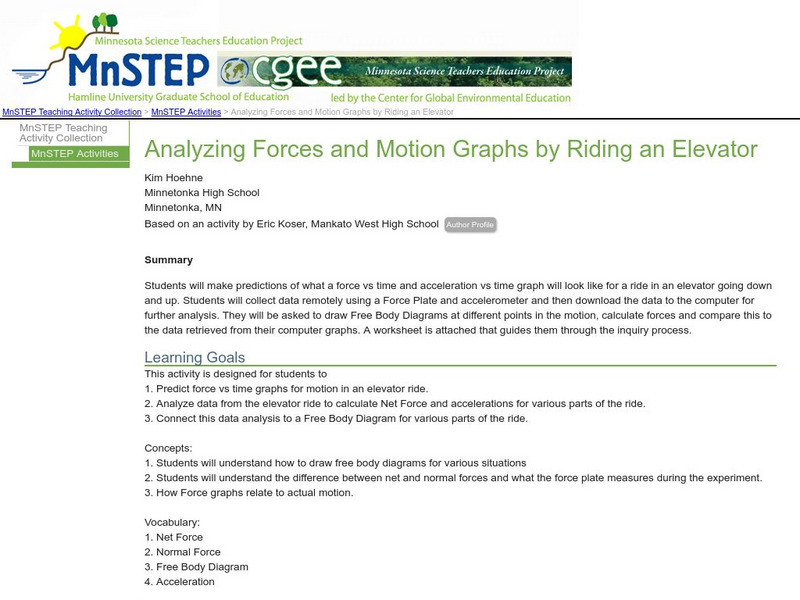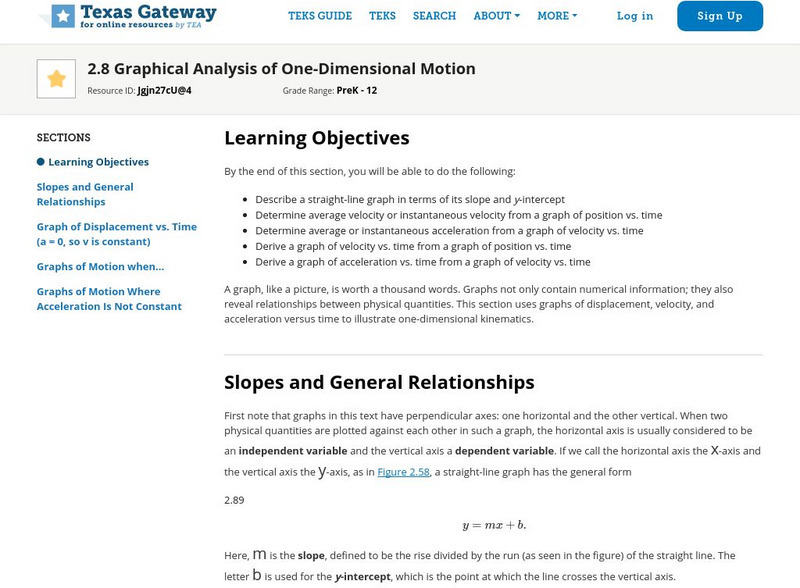Hi, what do you want to do?
Curated OER
Hot Friction
Sixth graders use small electronic devices known as thermistors to measure the temperature beneath an object such as a coffee cup as it slides across a surface. By choosing different surfaces, 6th graders can compare in a quantitative...
Curated OER
Measuring the Speed of a Wave
Students create an experiment in which they measure the speed of a wave and record the data in a graph. They work in small groups to write the procedure for the experiment and share it with another group for cross checking of the...
Curated OER
Help! I'm Under Too Much Pressure!
Students play with a ping pong ball sized piece of modeling clay observing what happens to the clay as they play with it and write their observations in their notebooks. They share the results of their observations introducing the term...
Curated OER
Velocity
Students determine the average speed of a toy car as it travels six different distances set up by Students. Three trials are done for each distance. The only requirements is that the longest distance must be at least three times longer...
Curated OER
Physical Pendulum Lab
Students calculate the moment of inertia of a disc. For this physics lesson, students differentiate the two methods used in finding the inertia. They construct their own pendulum for the lab.
Curated OER
Investigation of Hooke's Law Lab
Learners determine the spring constant by conducting an investigation. In this physics lesson, students collect data and create a graph of force vs. displacement. They compare the results of two different methods to find spring constant.
Curated OER
Deceleration of a Toy Truck
Eighth graders complete labs using toy trucks to study deceleration, record thier data, and then transfer it to graphing software to produce a graph. They create a lab report of the completed lab using a word processing program.
Curated OER
Skyscraper Capers
Learners discuss skyscrapers and listen as the teacher introduces the project. They use the Internet to perform research on one skyscraper. Students use information they gather to create a brochure of their building . They create an...
Curated OER
Looking into Eratosthenes' Radius of the Earth
Students, in small groups, research Eratosthenes and his calculations of the Earth's radius. They write a summary of the person, the experiments and his calculations to determine how accurate Eratosthenes was in his estimations of the...
Curated OER
The Unit Circle
Students relate the trigonometric functions to the coordinates of the unit circle. They classify trigonometric functions as odd or even. Students determine the signs of trigonometric functions in each quadrant. They are explained that...
Curated OER
Newton's 2nd Law
Fourth graders discuss Newton's Second Law of Motion, and the acceleration of fast and slow moving objects. They experiment with items with different masses to determine the effect mass has on acceleration using a toy car. They complete...
Curated OER
Did You Catch My Drift?
Students, through the use of the Curveball interactive software package, become familiar with the way in which the flow of air across or around an object affects its ability to lift, spin, and curve. After reading the explanation given...
Curated OER
Propulsion Pop!
Students demonstrate an understanding of the text by completing a propulsion activity, charting the results, and answering questions that demonstrate an understanding of rocket propulsion.
Curated OER
Using FoilSim to Measure Your Elevation
Students, after designing model wings, demonstrate an understanding of wing design by testing models of the wing types both experimentally and by computer modeling in FoilSim and then presenting their results.
Curated OER
Good Vibrations
Middle schoolers demonstrate sound waves and make changes in the waves
resulting in changes in pitch. Students associate changes in pitch in various "musical instruments"with size and shape and the sound waves they produce.
Curated OER
Cosmic Ray Momentum
Students describe how cosmic rays achieve high kinetic energy via conservation of momentum.
Curated OER
The Unit Circle
Students relate the trigonometric functions to the coordinates of the unit circle with access to explorelearning.com. They determine the signs of trigonometric functions in each quadrant.
Curated OER
Worksheet 19
In this math worksheet, students use the following descriptions of a spring system to write a differential equation of the form my + γy + ky = F(x).
Curated OER
Wind Gauges
Students use FoilSim interactive software to become familiar with the way in which the flow of air across or around an airfoil affects its ability to create lift.
Science Education Resource Center at Carleton College
Serc: Analyzing Forces and Motion Graphs by Riding an Elevator
A high school physics lab on classical mechanics in which students study force versus time and acceleration versus time. Students need access to an elevator to complete the experiments. A lab handout is provided.
CK-12 Foundation
Ck 12 Exploration Series: Simulations: Physics: Irwin and Ruthie
[Free Registration/Login Required] Learn about the relationship between position, velocity, and acceleration for two objects in one-dimensional motion. Experiment with varying approaches to the race for both Irwin and Ruthie to see how...
Science Education Resource Center at Carleton College
Serc: Investigating Motion Graphing Speed
In this introduction to motion activity, learners will get a personal understanding of speed and acceleration by experiencing it firsthand. Wheeled office chairs or other cart like devices are used to give one student a ride as a fellow...
Texas Education Agency
Texas Gateway: Kinematics: Graphical Analysis of One Dimensional Motion
By the end of this section, you will be able to describe a straight-line graph in terms of its slope and y-intercept, determine average velocity or instantaneous velocity from a graph of position vs. time, determine average or...




























